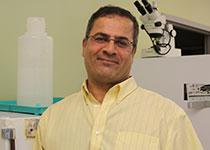
Dr. Burhan Gharaibeh is an Appointment Stream faculty member at the Department of Biological Sciences, and an adjunct faculty member in the School of Health and Rehabilitation Sciences at the University of Pittsburgh and a Research Associate with the Natural Science Research Laboratory at Texas Tech University. Prior to his current appointment, he worked as a Senior Researcher at Biopatterning and Tissue Engineering Laboratory, the Institute for Complex Engineered Systems, Carnegie Mellon University (CMU). Dr. Gharaibeh also worked as a Research Assistant Professor in the Stem Cell Research Center, Department of Orthopaedic Surgery, with a secondary appointment in the Department of Bioengineering, both at the University of Pittsburgh. Dr. Gharaibeh received his PhD in Zoology from Texas Tech University in 1997. He also has an MSc in Zoology and a BSc in Biological Sciences, both from Yarmouk University in Jordan. Dr. Gharaibeh is a member of the American Orthopedic Society, the International Stem Cell Research Society, and the American Society for Gene Therapy. He also participates in community outreach by presenting popular scientific lectures on the topic of stem cells, bioethics, and regenerative medicine to various high schools and adult education programs in the area. Dr. Gharaibeh is a journal reviewer for the following publications:
- Alternative and Complimentary Medicine
- Arthritis and Rheumatism
- Biopreservation and Biobanking Journal
- Journal of Applied Physiology
- Journal of the Royal Society Interface
- Materials
- Nature Science Reports
- Stem Cell Research and Therapy
- Tissue Engineering
- Transplantation
Dr. Gharaibeh’s current research interests are in stem cell biology. He is studying inflammation which results after a musculoskeletal injury particularly in the tendon. Another project involves Dr. Gharaibeh’s current interest in cell-to-cell interaction and how the process of interaction may be analyzed using time-lapse videos and by statistically examining the parameters obtained. The results obtained thus far have shown that the dynamics of stem cell populations display multiple sub-population behaviors and heterogeneity in the phenotype. He has started research with new tools including the IVIS caliper in vivo imaging system, available in CMU’s Molecular Biosensor and Imaging Center in Mellon Institute, and the biological inkjet printer in the Biopatterning and Tissue Engineering Laboratory.
